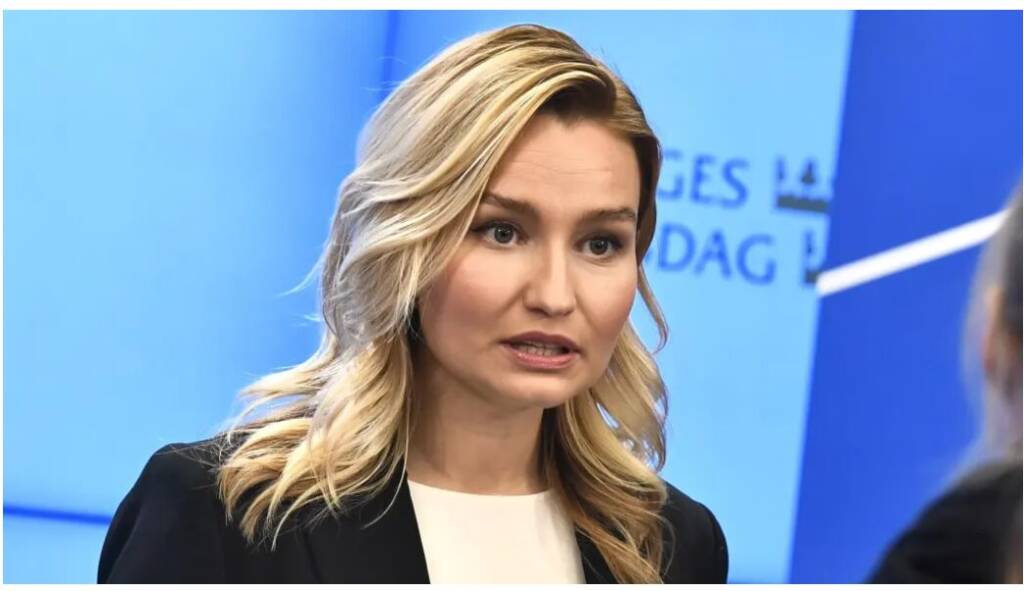In a statement that has ignited widespread debate, Swedish Deputy Prime Minister Ebba Busch has called for Islam to adapt to Swedish values, asserting that Muslims who do not integrate into Swedish society should leave the country. Her remarks have stirred controversy, raising questions about cultural integration, religious freedom, and Sweden’s immigration policies.
Speaking to reporters, Busch emphasized the need for Muslims in Sweden to practice their faith in a manner compatible with Swedish law and cultural norms. “Islam must adapt to Swedish values. Muslims who do not integrate should leave the country. Sharia law doesn’t belong here,” she stated. Busch further clarified that those who fail to integrate would not be granted asylum in Sweden and should return to their countries of origin.
Busch cited recent events, including celebrations in Swedish streets following the Hamas attack on Jews on October 7th, as evidence of practices within the Muslim community that she believes are incompatible with Swedish values. “Honor killings, beheadings, stoning of women, and Sharia law have no place here,” Busch added, underscoring her stance.
Sweden has a complex history of immigration, characterized by waves of migrants seeking refuge from war, persecution, and economic hardship. Since World War II, Sweden has been a destination for migrants from various regions, including the Middle East, Africa, and the Balkans. The country’s policies have generally been welcoming, with a strong emphasis on humanitarian values.
Historically known for its openness to refugees, Sweden has seen a significant increase in its Muslim population over recent decades. As of 2022, the Muslim population in Sweden was estimated to range between 250,000 and 400,000, making up about 1.8% to 4.4% of the total population. This growth has brought both cultural enrichment and challenges related to integration.
Sweden’s history of immigration dates back centuries, with various waves of migrants contributing to the country’s cultural and economic development. However, the rise in asylum seekers in recent decades, particularly from Muslim-majority countries, has led to a complex and often contentious debate over how to integrate these new residents into Swedish society.
Busch’s comments have significant implications for both domestic and international audiences. Domestically, they reflect a growing concern among some Swedes about the ability of immigrants, particularly Muslims, to integrate into a society with strong secular and liberal values. The Deputy Prime Minister’s call for Islam to adapt could be seen as an infringement on religious freedoms, potentially alienating the Muslim community and deepening societal divisions.
The rhetoric also risks exacerbating existing tensions, with the potential for increased incidents of Islamophobia and hate crimes. Critics argue that such statements may undermine efforts to create a cohesive, multicultural society and could lead to further marginalization of Muslim immigrants.
Internationally, Busch’s comments may strain Sweden’s relations with Muslim-majority countries and international organizations that advocate for human rights and religious freedom. The statements could be perceived as a shift toward more exclusionary immigration policies, raising concerns about Sweden’s commitment to humanitarian principles.
The challenge of integrating immigrants into Swedish society is multifaceted, involving cultural, religious, and legal aspects. Sweden’s secular and liberal values, including gender equality and LGBTQ+ rights, sometimes clash with the cultural and religious practices of some immigrant communities. Muslim immigrants, in particular, have faced challenges related to discrimination, Islamophobia, and legal issues, such as the debate over the wearing of religious symbols in public spaces. The ongoing tensions around the integration of Muslims into Swedish society highlight the difficulties of balancing religious freedom with the need for social cohesion.
Ebba Busch’s statements have brought to the forefront the ongoing debate about immigration and integration in Sweden. While her remarks resonate with those concerned about preserving Swedish values, they also raise critical questions about the limits of cultural integration and the potential consequences of exclusionary rhetoric. As Sweden continues to grapple with these issues, the challenge will be to find a path that respects both the country’s cultural heritage and its commitment to diversity and inclusion.
